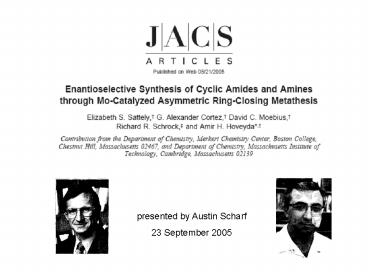presented by Austin Scharf - PowerPoint PPT Presentation
1 / 27
Title:
presented by Austin Scharf
Description:
Enantioselective Synthesis of Cyclic Amides and Amines through Mo ... Chirality. parts from Welch, C., Szczerba, T., and Perrin, S. 'Review of Stereochemistry. ... – PowerPoint PPT presentation
Number of Views:78
Avg rating:3.0/5.0
Title: presented by Austin Scharf
1
presented by Austin Scharf 23 September 2005
2
To understand this paper, lets first make sure
we understand the title
Enantioselective Synthesis
of Cyclic Amides and Amines
through Mo-Catalyzed
Asymmetric
Ring-Closing Metathesis
3
Enantioselective Synthesis of Cyclic Amides and
Amines through Mo-Catalyzed Asymmetric
Ring-Closing Metathesis
Chirality
parts from Welch, C., Szczerba, T., and Perrin,
S. Review of Stereochemistry. Internet
http//www.registech.com/chiral/chiralreview.pdf.
Regis Technologies, Inc., 2000.
4
Enantioselective Synthesis of Cyclic Amides and
Amines through Mo-Catalyzed Asymmetric
Ring-Closing Metathesis
Amides
Amines
5
Enantioselective Synthesis of Cyclic Amides and
Amines through Mo-Catalyzed Asymmetric
Ring-Closing Metathesis
Lewis acidic
16 electrons
electron deficient
Chiral
Sterically Encumbered
6
Enantioselective Synthesis of Cyclic Amides and
Amines through Mo-Catalyzed Asymmetric
Ring-Closing Metathesis
Prochiral
Racemate
If we form one enantiomer selectively, this is
asymmetric induction.
7
Enantioselective Synthesis of Cyclic Amides and
Amines through Mo-Catalyzed Asymmetric
Ring-Closing Metathesis
1950s
1970s
1990s
Figure 2 from Trnka, T.M. and Grubbs, R.H.
L2X2RuCHR Olefin Metathesis Catalysts An
Organometallic Success Story. Acc. Chem. Res.,
2001, 34, 18-29.
8
Lets get to the NITTY GRITTY
enerate
ptically enriched
Goals
mides and amines that
ook
omething like
9
N-fused bicyclic amides
Mechanism
10
This one is cool!
This one looks yucky at first
11
70 yield
30 yield
12
Both pathways give the same product!
92 yield!
13
NMR reaction monitoring
X
4 peaks 1 triplet, upfield, 2H 1 multiplet, 2H 2
doublets (of doublets), 1H each
2 peaks 1 doublet, 2H 1 triplet, d 11.97 ppm, 1H
14
N-fused bicyclic amines
Good yields, but only 30-40ee
15
Unsaturated Cyclic Secondary Amines
With P H, this reaction gave lt2 conversion!
16
Liars!
These are sterically hindered by the neighboring
quaternary carbon, so the N?Mo chelation doesnt
happen as much.
17
Target-Oriented Synthesis!
18
This is neat-o.
19
Conclusions
1. Optically enriched N-fused cyclic amides are
accessible via metathesis
2. Optically enriched N-fused cyclic amines are
kinda accessible via metathesis
3. Optically enriched unsaturated cyclic
secondary amines are accessible through protected
tertiary amine intermediates
20
Applications
1. Resolving racemates
2. ORGANIC SYNTHESIS -- Natural Products
cephalezomine skeleton
serratinine
stemonamide
21
Many thanks, sirs and madam!
22
References
1 Trnka, T.M. and Grubbs, R.H. L2X2RuCHR
Olefin Metathesis Catalysts An Organometallic
Success Story. Acc. Chem. Res., 2001, 34,
18-29. 2 Hérisson, J.-L. and Chauvin, Y.
Catalyse de transformation des olefins par les
complexes du tungstène. Die Makromolekulare
Chemie, 1970, 141, 161-176. 3 - Dieters, A. and
Martin, S. Synthesis of Oxygen- and
Nitrogen-Containing Heterocycles by Ring-Closing
Metathesis. Chemical Reviews, 2004, Vol. 104,
pp. 2199-2238. 4 Miessler, G.L. and Tarr,
D.A. Inorganic Chemistry, 3rd ed. Upper Saddle
River, NJ Pearson, Prentice Hall, 2004. pp.
546 ff. 5 Alexander, J. La, D. et al. J.
Am. Chem. Soc., 1998, 120, 4041-4042. 6 For an
in-depth discussion of catalyst structure,
electronic configuration, isomerization, and
stability, see Schrock, R.R. and Hoveyda, A.H.
Molybdenum and Tungsten Imido Alkylidene
Complexes as Efficient Olefin-Metathesis
Catalysts. Angewadte Chemie, International
Edition, 2003, Vol. 42, pp. 4592-4633. 7
Dolman, S.J. Sattely, E.S. Hoveyda, A.H. and
Schrock, R.R. J. Am. Chem. Soc., 2002, 124,
6991-6997. 8 Bubnov, Y.N. Pastukhov, F.V.
Yampolsky, I.V. Ignatenko, A.V. Eur. J. Org.
Chem., 2000, 1503-1505. 9 Though little is
understood thoroughly, some hypotheses regarding
the mechanism of enantioselectivity in these
systems have been proposed. For one such
hypothesis, see Xie, M. Desymmetrization
Through Enantioselective Olefin Metathesis.
University of Illinois Graduate Program in
Chemistry. Internet http//www.scs.uiuc.edu/che
m/gradprogram/chem435/fall04/09_Xie_Abstract.pdf.
18 November 2004. 10 For some of the few
syntheses reported, see Kende, A.S. Martin
Hernando, J.I. Milbank, J.B.J Org. Letters,
2001, 3(16), 2505-2508 Koseki, Y. Sato, H.
Watanabe, Y. Nagasaka, T. Org. Letters, 2002,
4(6), 885-888 and Charette, A.B. et al. J. Am.
Chem. Soc., 2001, 123, 11829-11830. 11 For a
more comprehensive account of the natural
products synthesized by these and similar
methodologies, see Dieters, A. and Martin, S.
Chem. Rev., 2004, 104, 2199-2234.
23
Addendum 1 Catalyst Structure
steric blockage imido w/ R
syn vs. anti isomers
hyperconjugation
180 Mo-N-Ar bond
24
Addendum 2 RCM Mechanism, In More Detail
Molybdenum coordinates with non-terminal carbon
because there is higher electron density there.
Molybdenum coordinates with the terminal carbon
because the other is too sterically hindered.
25
Addendum 3 Synthesis of Substrates
Conditions reported by Bubnov, Y.N. Pastukhov,
F.V. Yampolsky, I.V. Ignatenko, A.V. Eur. J.
Org. Chem., 2000, 1503-1505.
26
Addendum 4 Protecting Groups
Cbz
catechol-borane
Ac
Bn
27
Addendum 5 Kinetic Resolution
We start with a mixture of enantiomers. One
enantiomer reacts more quickly than the other, so
we obtain a disproportionate amount of one
product over the other. This disproportionality
is measured by krel, which should usually be gt10
or 20. Apparently 8 was good enough for this
time.































